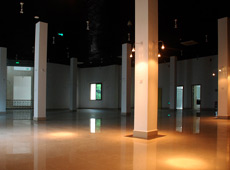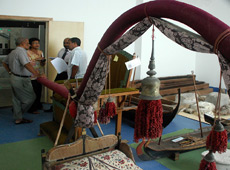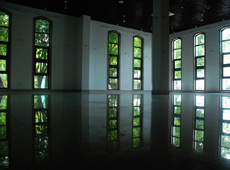The Maldives celebrated its 45th Independence Day on July 26th and 27th.
Following a special prayer conducted after the dawn prayer, President Mohamed Nasheed inaugurated and launched different government offices and institutions in Male’.
Flag Hoisting Ceremony
Following the dawn prayer, a flag hoisting ceremony was held at Jumhoory Maidhaan where the large national flag is located. Students at senior posts of different schools, the Maldives National Defence Force (MNDF) and police attended the ceremony.
Addressing the nation, President Nasheed promised to fulfill the mandate given him by the people to consolidate democracy and create the foundations of good governance in the Maldives.
Nasheed said the government would remain resolute in freeing the country from “the bondage of corruption”.
“As the flag of independence flies high, it is a greater national duty to free the country from suspicions in the hearts of the people that bribery and corruption have taken root in the legislature and the judiciary,” he said.
“Unlike previous regime changes, the replacement of government in 2008 did not completely end the power of those connected to the previous regime,” Nasheed said.
The same officials who worked in the previous regime remain active in the executive, courts, and other institutions, he said.
“If [after the presidential elections in 2008] any change came to the bond that existed between the previous leadership and the executive and the judicial branches over those 30 long years, such change was only small,” Nasheed said.
He said he did not want to accept that the government’s power lay in the use the force: “of guns, shackles, and the pillory.”
“The government’s power that we believe in is that of serving the people,” said the President.
Describing the reasons for the current political impasse, the President said “because of the restraint shown…against the influence from officials of previous government, their hopes for coming back to power have flared up.”
“As their pace to come back to power quickened, the constitutional framework was becoming unsettled, disrupting the provision of basic services to the people.”
The President said that to find a long term solution to the political impasse, it was essential to strengthen the constitution as it presently “does not allow an effective presidential system.”
“To my mind, if we want to find a [long term] solution to the current problems, we must amend some articles in the constitution.”
The President reiterated that he was “ready to give way for any elections required in order to bring about those amendments.”
“At no point will I hesitate to face the people and learn what they desire.”
Velaanage inauguration
State Dignitary Ibrahim Rasheed inaugurated Velaanaage, the office complex built on the housing compound of the residence of the Velaanaage family who had rendered invaluable services to the Maldives.
Ibrahim Nasir, the first President of the Second Republic of the Maldives, lived in Velaanaage.
Ibrahim Rasheed addressing the people, said the Maldives continue to receive the valuable services from members of Velaanaage family.
At the ceremony, President Mohamed Nasheed donated a historic shield to President Nasir’s Memorial Room in Velaanaage. The shield was sent to President Ibrahim Nasir on his inauguration as the first President of the Second Republic of the Maldives in November 1968 by President Lyndon B. Johnson of USA.
Fifteen years ago, President Nasir gave the shield to his youngest son Ismail Nasir, who later presented it to President Nasheed. He also spoke on the importance of the Memorial Room which will display manuscripts and some other memorabilia belonging to President Nasir and his family.
In his remarks at the ceremony, President Nasheed said the Velaanaage family was one of the oldest families in the Maldives.
Inauguration of Iskandhar Building
Vice president Dr Mohamed Waheed Hassan Manik inaugurated the Maldives Police Service Iskandharu Building, a building to house the police forensic department and containing modern technologies for the forensic investigation of crimes.
Dr Waheed said that ensuring the rule of law and protecting the rights of the people were the primary duties of police.
He said that while the key to people’s happiness and society’s strength lay in their confidence in justice and the rule of law and justice, it was a responsibility of police to ensure the rule of law in the country.
In his remarks at the ceremony held at Iskandharu Koshi, to inaugurate the building, Commissioner of Police Ahmed Faseeh said the building would ease the difficulties faced by lack of space and thus help improve the quality of services to the people.
Inauguration of National Museum
President Mohamed Nasheed inaugurated the new National Museum, which was built with the assistance of the Chinese government’s aid program, ‘China Aid’.
Speaking at the ceremony, Nasheed said the Maldives has a long history, with a written history of more than 1,000 years.
Nasheed said the lessons from history “teach us to respect and uphold human rights.” He said that Maldivians, today, would no longer tolerate any form of abuse or torture.
He thanked everyone involved in the Museum project.
“I would especially like to thank Chinese President Hu Jintao, Premier Wen Jiabao, the government and the people of China,” he said.
Parade and Guard of Honor
President Mohamed Nasheed and Madam Laila Ali attended a parade and route march held to celebrate the Independence Day.
Upon their arrival at Jumhooree Maidhaan, the President and the First Lady were greeted by Minister of Home Affairs Mohamed Shihab and his wife Aminath Shimla.
The President was received a Presidential Salute, after which the brass band of the MNDF played the National Anthem. The Armed Forces Guard then trooped past the Presidential Stand.
Music Show
In the celebration of the independence day a music show was held at the main stage at Alimas Carnival in Male. Famous actor ‘Chilhiya’ Moosa Manik presented the show. Old traditional songs were performed at the show by different artists. More than 50 people attended to watch the show.
A special function by the President and First lady was held at Dharubaaruge last night. Senior government officials, independent commissions and diplomats attended the function.
Rain cancelled other events
On July 27, other events scheduled for Independence Day were cancelled due to bad weather. The parade of the Maldives National Cadet Corps and bands of students scheduled to be held yesterday evening were also cancelled, along with the other events.



